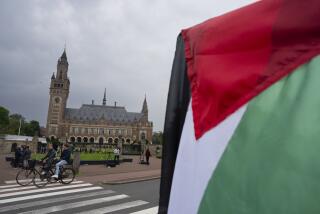Indefinite Detentions Upheld in S. Africa
- Share via
JOHANNESBURG, South Africa — The nation’s highest court ruled Tuesday that the government is permitted under the national state of emergency to detain its opponents indefinitely and without charge.
The unanimous decision by the appellate division of the Supreme Court in Bloemfontein blocked legal moves to free an estimated 8,000 to 10,000 political detainees, many of whom have been held in solitary confinement since President Pieter W. Botha declared the state of emergency June 12.
After successive legal defeats in recent months, the ruling was a major victory for South Africa’s white-led minority government and appeared to ease pressure on it to end the state of emergency and rescind the martial-law powers given the police and army.
In upholding Botha’s authority to make whatever emergency regulations he believes necessary to deal with the country’s continuing political violence, the decision also seemed likely to restrain South Africa’s increasingly activist lower courts from declaring more of the government’s security actions illegal.
The ruling upheld emergency regulations permitting police to detain anyone indefinitely without charge, without trial and with severe restrictions on the right of defense, if they believe the person is contributing to the current unrest, has in the past or might do so in the future.
Lower Court Decisions
These powers had been limited by several lower court decisions, which required police officers to be able to prove they were acting in good faith and with reason to suspect a person has contributed to unrest. But with Tuesday’s decision, the regulations now stand essentially unchanged.
More than 16,000 people have been detained over the past 3 1/2 months, according to anti-apartheid and civil rights monitoring groups, and more than half are believed to be still held. Criminal charges have been brought against less than a quarter of those detained, according to announced government figures.
Anti-apartheid groups argued that detention without trial, and the other powers given the security forces under the emergency regulations, effectively turned South Africa into a totalitarian police state and that Botha had exceeded his legal authority in issuing the regulations.
One lower court, the Durban bench of the Natal provincial Supreme Court, agreed in August with the government’s critics and declared major parts of the regulations invalid, freeing a prominent anti-apartheid activist. But four days later, a second court, the Pietermaritzburg bench of the Natal Supreme Court, accepted the government’s argument that Botha had acted within his authority in permitting indefinite detention.
The conflicting judgments stemmed partly from difficulty in interpreting differing English- and Afrikaans-language versions of the Public Safety Act under which Botha declared the state of emergency.
Top of the Agenda
With the freedom of thousands of political detainees at stake, as well as the government’s power to rule largely by decree in black areas, the five-judge appeals court put the two conflicting decisions at the top of its agenda for review.
In South Africa, Parliament is supreme, and there are no constitutional guarantees to protect individual rights. The only real issue before the appeals court, therefore, was the interpretation of security legislation enacted by Parliament, which Botha’s ruling National Party has controlled since 1948.
Chief Justice Petrus Rabie, supported by four other appeals court judges, said in a 64-page ruling that the Afrikaans text of the Public Security Act takes precedence over the English, as it is grammatically clearer. The Afrikaans version in no way “qualifies or limits the power” of the president to issue detention regulations so long as they are used to maintain public order, he said.
Rabie found the Durban court’s interpretation of the law “forced and strained” in placing severe restrictions on the government’s authority to act. This was not the intent of Parliament in giving the president power to declare a state of emergency, Rabie said. The Durban decision was thus overruled, and the Pietermaritzburg decision was upheld.
Meanwhile, a bomb exploded early Tuesday at an electricity substation in an industrial suburb south of Durban, causing minor damage and no injuries, according to the government’s Information Bureau, the only authorized source of news on the continuing unrest here. Limited and scattered unrest was reported elsewhere around the country, particularly in eastern Cape province.
In East London, Botha stepped down as leader of the ruling National Party in Cape province in favor of J. Christiaan Heunis, the minister of constitutional development and planning. Heunis is thought to be a possible successor to the 70-year-old president on his eventual retirement, which is believed to be still some years away. Botha had headed the party in his native province for 20 years.
More to Read
Sign up for Essential California
The most important California stories and recommendations in your inbox every morning.
You may occasionally receive promotional content from the Los Angeles Times.













